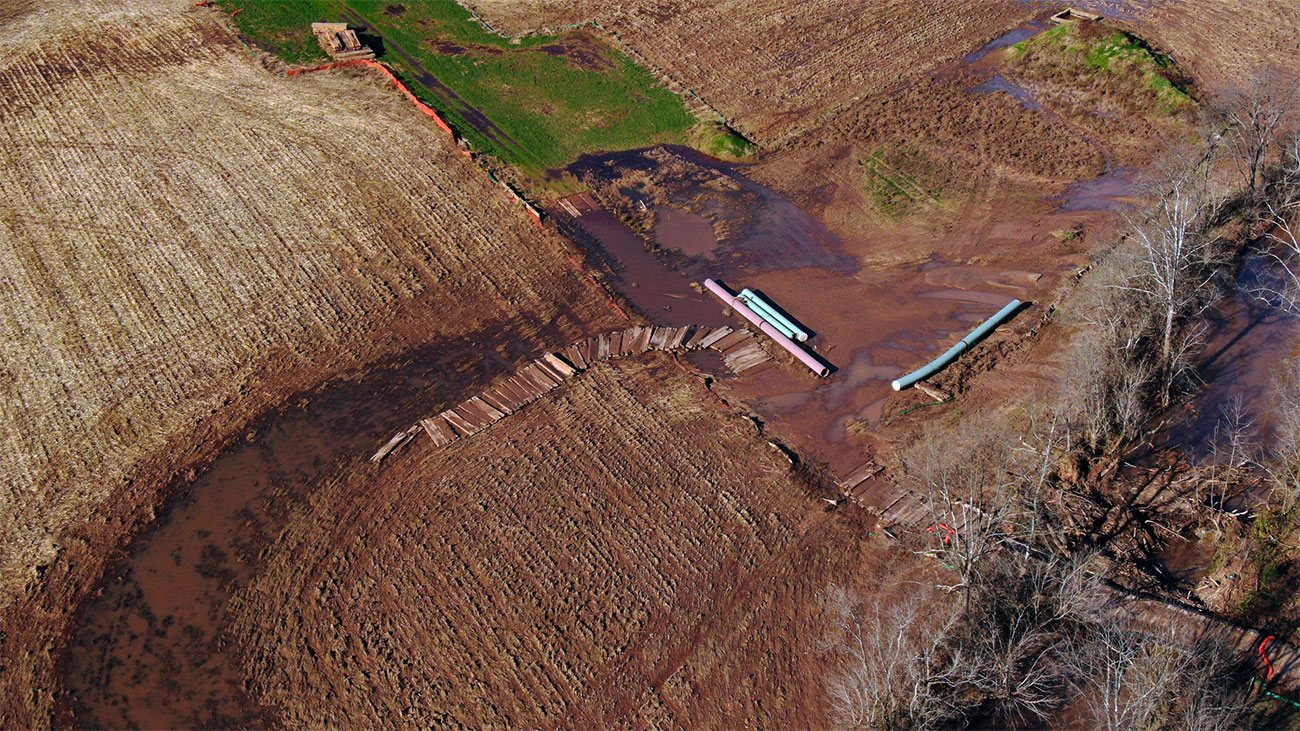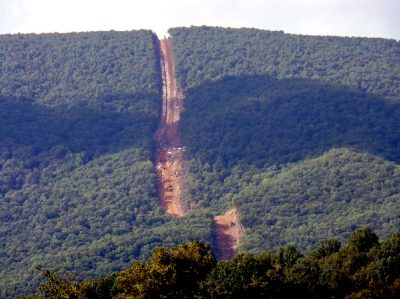
With the most difficult and risky work remaining, the project is far from complete
Nine years after private companies set out to build the 303-mile Mountain Valley Pipeline across the mountains, rivers and farmlands of West Virginia and Virginia, the project is billions of dollars over budget and years behind schedule. Moreover, experts have highlighted evidence since the project’s start that there is no economic need for the pipeline — with that evidence continuing to mount in the years since.
And the community-led movement to stop it is bigger and stronger than ever.
The Status and Impact of the Mountain Valley Pipeline
In 2022, we released a report exploring the current status of the pipeline, including the scope of the remaining work and the harms that local communities have already experienced, including degraded drinking water, damaged farmland and harm to Indigenous sacred sites.
While there are people speaking up and fighting to stop the pipeline, MVP is being bolstered by state and federal agencies whose missions are to protect communities and the environment. Agencies like the Federal Energy Regulatory Commission and the Virginia Department of Environmental Quality have assisted MVP developers to advance their project by disregarding the dire warnings of thousands of community members, geologists, karst specialists, engineers, health professionals and allies who have all said that there is no way to build MVP without harmful impacts.
The Virginia DEQ ignored its mandate as a watchdog for the state’s environment and residents by approving water permits for MVP to cross rivers, streams and wetlands. MVP has racked up at least 350 water quality violations in Virginia since construction began in early 2018 and over $2.5 million in fines. In the meantime, incidents of mudslides, rolling equipment, slipped pipe and increased sediment in waterways have occurred.
The project has been wrong at every stage of its development: bad planning and poor construction, faulty erosion and sediment control attempts, and improper assessment and enforcement of fines. The communities, on the other hand, have been justified at every stage: raising the alarm, engaging elected officials, sharing knowledge and expertise about the region, alerting regulators, monitoring construction, challenging MVP in court when necessary, supporting each other and bringing the fight against dirty fossil fuel energy to a broader audience.
Fast Facts
Where: 303 miles through West Virginia and Virginia
Diameter: 42 inches
Owner: Mountain Valley Pipeline, LLC. Equitrans Midstream Corp. is the lead developer.
Developers’ Projected Cost and Timeline in 2014: Up to $3.5 billion, complete by late 2019
Developers’ Projected Cost and Timeline as of Spring 2023: Up to $6.2 billion, complete by summer of 2023
Work remaining: 429 water crossings remain and MVP is only 55.8% complete to full restoration
Proposed “Southgate” extension: In 2018, MVP announced plans to extend the mainline 70-miles from Virginia into North Carolina. The two projects are inextricably tied together, despite going through separate approval processes.

The 2022 Hands Across the Appalachian Trail in Pearisburg, Virginia. Photo credit: Russell Chisholm
Residents Say: “No to Mountain Valley Pipeline!”
When plans for MVP were announced in 2014, residents along the route swiftly organized, educating themselves on potential impacts and sharing information with each other. They set up meetings and formed community-led groups, like the Protect Our Water, Heritage, Rights Coalition and Mountain Valley Watch, a collaboration of volunteers and experts who observe, document and report environmental issues they see during the pipeline’s construction.
Appalachian Voices has supported community-led efforts in myriad ways — hosting water quality monitoring trainings with Trout Unlimited and West Virginia Rivers Coalition, helping connect opponents with allies, lawmakers, the media and others, and providing technical and organizing guidance.
Multiple local governments, like Craig County, VA and Roanoke County, VA have expressed opposition against the pipeline due to pressure from constituents who oppose MVP. Community groups have organized protests and demonstrations against the pipeline with some individuals being arrested for protesting or participating in tree-sits at or near pipeline construction sites.
Below we have highlighted some of the concerns from communities along Mountain Valley Pipeline’s path:
Environmental justice: The MVP would disproportionately impact low-income communities, elderly residents and Indigenous sites.
Environmental damage: Developers have accrued hundreds of water quality violations and polluted miles of streams and important freshwater habitat. Potential violations stacked up even when stop-work orders stalled construction for months.
Climate impacts: Methane is an extremely potent greenhouse gas and exacerbates climate change. Building this pipeline and others would lock the U.S. into decades of dirty energy.
Destruction of natural beauty: MVP would leave a 50-foot-wide strip of permanently cleared land scarring viewsheds along the entire route, including along the Appalachian Trail and Blue Ridge Parkway. It would also cut through about 3.5 miles of the Jefferson National Forest.
Explosions: Much of the pipeline is being built on steep, unstable slopes that are susceptible to landslides — which could cause the pipe to rupture. Explosions happened on two separate pipelines in similar terrain in 2018. In April 2020, MVP reported that three sections of laid pipe had shifted due to land movement. MVP’s use of thinner pipe in less-populated areas means the pipe may be more susceptible to the risk of rupture.
Eminent domain for private gain: In typical industry-friendly practice, the Federal Energy Regulatory Commission allowed MVP to seize people’s land all along the route through eminent domain — even before the developer had secured all required permits and without requiring the company to pay people upfront for their land.

A section of the unfinished Mountain Valley Pipeline near Virginia’s Brush Mountain in July 2020. Photo courtesy of Mountain Valley Watch
Legal Action against Mountain Valley Pipeline
In a rush to get this unnecessary project built, developers bulldozed through permit processes, moving forward with construction even when not all permits were in place. Work on the pipeline has trudged on in fits and starts for the past several years as opponents have successfully challenged state and federal approvals. Appalachian Voices has partnered with legal teams at Appalachian Mountain Advocates and Sierra Club to challenge MVP’s actions in court to hold it accountable and to stop this ill-conceived, dangerous and unneeded project.
In October 2019, as a result of repeated violations by MVP and persistence from opponents, FERC ordered virtually all work to stop along the pipeline in both states. A year later, however, the stop-work order was lifted for all but a few sections of the pipeline.
A restriction on construction through streams, rivers and wetlands was in effect from fall of 2020 until June 2023, when the U.S. Army Corps of Engineers issued their Clean Water Act 404 permit.
Federal Legislative Updates
Repeated attempts by West Virginia Sen. Joe Manchin to ram through the Mountain Valley Pipeline and radically weaken safeguards for our communities and environment through legislation failed in 2022. But, in June 2023,. Manchin successfully added Mountain Valley Pipeline provisions to an unrelated debt ceiling bill, the “Fiscal Responsibility Act.”
The provisions included in the debt ceiling deal forced executive agencies to issue permits for the completion of the Mountain Valley Pipeline. These efforts were opposed by Virginia legislators: Sens. Tim Kaine and Mark Warner, and Reps. Jennifer McClellan, Bobby Scott, Don Beyer, Gerry Connolly, Jennifer Wexton and Abigail Spanberger. The constitutionality of the FRA is currently being challenged and the 4th Circuit Court of Appeals has issued a stay, to pause construction, for the project.
The Bad Economics of Mountain Valley Pipeline
Despite what analysts have long warned as a major overbuild of gas infrastructure, Equitrans Midstream Corp., NextEra Energy, RGC Midstream, LLC and others that make up the Mountain Valley Pipeline, LLC, are trying to build the pipeline as fast as possible.
The economic outlook for new, major fracked-gas infrastructure has shifted from bad to worse in the past five years — not that it was very good to begin with. Domestic and foreign demand for methane gas has fallen (insert number here) while the rapid growth of clean, renewable energy has proven as a reliable replacement for gas in the energy sector. Drilling companies could find themselves bankrupt as gas prices continue to fall. EQT Corp., a private equity company, is looking to dump some or all of its stake in MVP.
The purported need for MVP has dried up with many viewing the demise of the 600-mile Atlantic Coast Pipeline as a predictor for similar projects. Despite the developer’s skewing of facts and repeated claims in the media, the MVP is far from being a done deal.

Aerial view of the Mountain Valley Pipeline construction, Franklin County, VA. Photo by Mountain Valley Watch.
Continuing the Fight
Countless community groups and allied organizations including Appalachian Voices continue to push back against this fracked-gas pipeline, and the proposed Southgate extension into North Carolina. Below is a list of some of these organizations and networks.

- Protect Our Water, Heritage, Rights: A coalition of 15 local organizations in Virginia and West Virginia
- Mountain Valley Watch
- West Virginia Rivers Coalition
- Sierra Club Virginia Chapter
- Wild Virginia
- Center for Biological Diversity
- The Wilderness Society
- Blue Ridge Environmental Defense League
- Chesapeake Climate Action Network
- Appalachian Mountain Advocates
- Natural Resources Defense Council
- 7 Directions of Service
To get involved, contact:
VA: Jessica Sims, jessica[at]appvoices.org
NC: Ridge Graham, ridge[at]appvoices.org


